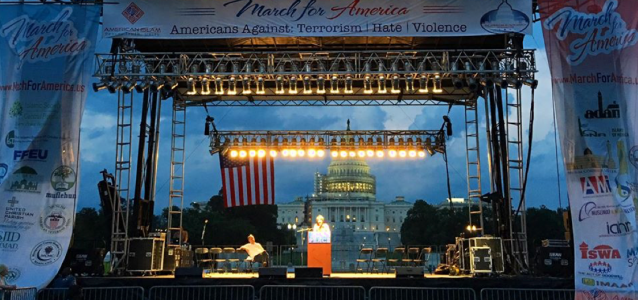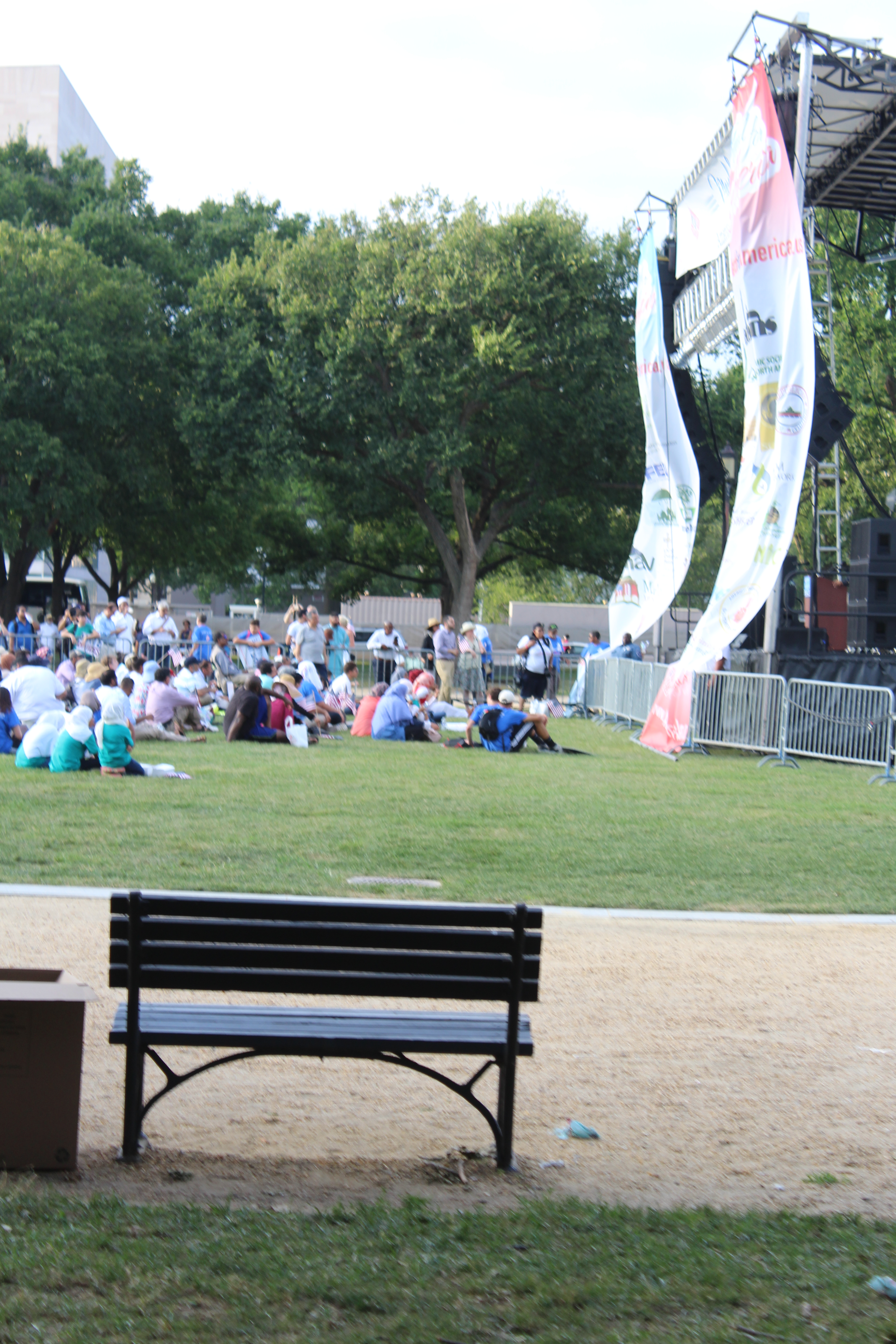On a scorching hot July 23, 2016, on the lawns of the National Mall with the Capitol building and the Washington monuments in clear view, several hundred people gathered for the American Muslim March on Washington: Liberty, Justice, Peace - a march against terrorism, hate, racism, and gun violence. Organized by a group in Florida called American Islam, Americans from all backgrounds were invited to attend. “If you want peace and support the celebration of diversity in the United States, this event is for you,” read the flier.
‘Muslims against ISIS’, ‘Islam is Peace’ signs dotted the mostly red, white and blue audience— many in star spangled hijabs, and camouflage fatigues— facing the stage. Instructions on the Eventbrite page included bringing a medium sized American flag and dressing in patriotic colors to show that ‘we are proud Americans’.
“When terrorists attack we all stand together,” stated Imam Muhammad Musri, of Orlando, FL. He is the imam of the Islamic Society of Central Florida, and the president of American Islam, Inc, the main organizer of the march. As he stood on the stage at the event he was flanked by his interfaith partners, Rabbi Steven W. Engel and Rev. Bryan G. Fulwider. The trio is known as the Three Wise Guys in the Central Florida interfaith community, where they host a weekly radio program with the same title.
The local sponsors included Muslim Community Center, Muslim Association of Virginia, ADAMS Center, MakeSpace, Islamic Society of Washington, Masjid Muhammad, Muslimaat al Nisa, IMAAM, McLean Islamic Center, First Hijrah Foundation amongst others.
A young man sat with his friends in the front listening to speeches by politicians and other leaders. Muhammad Rasheed of Fairfax, Virginia is a student at George Mason University. “I came because it is important that in a time of divisiveness that we show our support in favor of togetherness and unity,” he said.
“Muslims need to speak up against violence and terrorism. We want love and peace in the USA and all over the world,” said Khudeja Ilyas of Sterling, VA, whose young daughters cheered in their girls Scouts uniforms, as Dr V White Muhammad of the American Muslim Democratic Caucus of Florida spoke about the history of Muslims in the United States.
Saba Ahmed of Washington D.C., founder of the Republican Muslim Coalition, also spoke at the event. She had recently returned from the Republican Convention, which she attended along with at least 10 other Muslims, and spoke of the need for Muslim voices in the Republican party. She recently met with Trump and his vice-presidential pick, Mike Pence and Newt Gingrich. “We had a very open discussion about Sharia and how Muslims need to be involved with the discussions and how they really don’t know what the right solutions are. I think all of us are struggling with that. And I think involving Muslim Americans and bringing them to the policy tables is the right solution. I would love to be involved with national security discussions, and I hope that more Muslims will step up and get involved with the campaign and policies.”
Ahmed believes that Muslims need to proactively engage within the Republican Party and make a difference. She was especially concerned about the Republican Hindu Coalition, whose founder, a big businessman from Chicago, donated almost a million dollars to the Trump campaign because of Trump’s anti-Muslim. “He was supportive of profiling Muslims, and he was talking about how he wants to enact policies against Pakistan. For me it was interesting to see the special interests working against Muslims,” reported Ahmed.
Al Jazeera reported that organizers expected 100,000 to attend the rally.
The spokeswoman for the event, Aleyda Almorei of Orlando, FL, told the Muslim Link that she knew of no such figures quoted by her organization. “Extreme heat and [a] change in timing [also] deterred crowds,” she said.
In planning since last year, according to Almorei, the event was not in reaction to the Orlando shooting where a man, who was under FBI investigation for 10 months, shot 49 people at a nightclub, but against hate acts. “We have been suffering but were more motivated to stand up; we also added gun violence and racism to the agenda,” she said. 50 volunteers worked to get the event in order in Florida and 100 official volunteers were present at gathering.
Imraan Siddiqui, of Phoenix, AZ, Executive Director of the Council of American Islamic Relations- Arizona chapter, says that the event could have been more successful if the organizers had coordinated closely with a national level group. He did not attend the event.
The official Youtube advertisement for the event only has 396 views.
National activist Jaylani Hussein of Minneapolis, MN, who is also the executive director of CAIR-Minnesota, said the event was ‘rushed’. “There was no consensus building. An effort like this requires great marketing; you [have to] be like Louis Farrakhan [to get traction],” he said,” they didn't have the broad support,” he added. He was in Washington D.C. to attend a national leadership summit a couple of weeks after the march.
The small number of attendees gave fodder to Islamophobic websites.
“Last minute, mismanaged events contribute to the anti-Muslim rhetoric,” stated an attendee from San Fernando, California, wishing to remain anonymous, “this event had no focus.”
“I’m here with my family to support our religion also to give a good example to my kids of Islam and being Muslim,” said Yousry Othman, of Woodbridge, Virginia, who was there with his children including his 8 year old twins, Baher and Basel.
“We don’t apologize, we condemn all these acts of hatred, racism,” said Almorei. When asked why the need to condemn, when it perpetually placed Muslims in the guilty by association category, she said that it is important to condemn as there is a lack of education about Islam and media delivers an incorrect message about Muslims.
Commentator and blogger Sana Saeed disagrees with the idea of such marches. She writes: “... I'm tired of people in my communities constantly partaking in and creating public campaigns to put up a good face of our religion, condemn this group or that action and issuing this statement and that letter – I can't actually be angry with them. I can't blame them for wanting, so badly, to not have to hear the same questions again and again, day in and day out. I can't blame them for trying to show how they practice, envision and know Islam to an audience that only sees in black banners and white script...What we need is not the pacification of Islam vis a vis campaigns and rhetoric that are antithetical to our tradition and propel Jihad as only and primarily an internal struggle. What we need are not hashtags, videos, social media campaigns and signs that make it clear that whatever the current Muslim boogeyman in the news is doing has nothing to do with the rest of us who share belief in the same religion. What we need is not an ever-changing litmus test of who is Muslim and who isn't Muslim enough based on what makes our religion and us look bad. What we do need are internal campaigns to fix the broken parts of our communities; to reach those who feel disenfranchised, angry and powerless when they see their kin in their cities and around the world under fire, under surveillance, under suspicion and under clouds of blood and bombs. This isn't about so-called “counter-radicalism” but about making sure the particulars of our community are healthy so that the whole can be healthy. If one part hurts, the whole feels the pain. And we need more than publicly, poorly slapped on bandages.”
She says, “I will not condemn ISIS and I will not name, to whoever asks, the names of the moderates. I will not issue letters in the papers explaining this and lauding that and I will not sit at a table where the host with one hand praises my attendance and with the other denigrates my position in my society. I will, however, speak on my own terms and not with the neatly placed talking points meant to pacify and remind me of where I should sit and where I should stand.
Zafar Mirza, president of Muslim Community Center in Silver Spring, MD, spoke at the gathering. “Words can be weapons and can be used as a killer. In this era of hate mongering, [American Muslims] cannot afford to be silent,” he said.











Comments powered by CComment